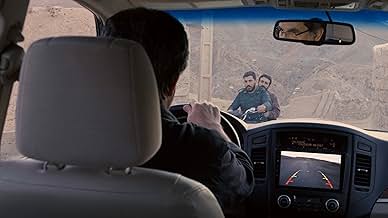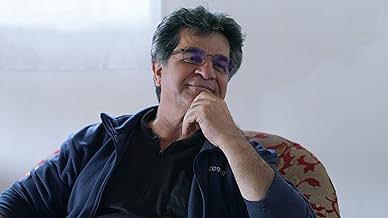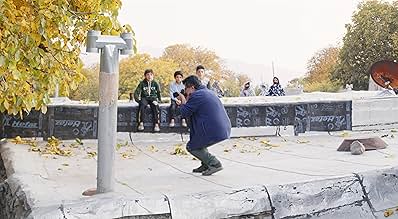IMDb-BEWERTUNG
7,2/10
4677
IHRE BEWERTUNG
Folgen Sie Anders Hofman, dem ersten Menschen, der einen Iron-Man-Triathlon in der Antarktis absolviert hat.Folgen Sie Anders Hofman, dem ersten Menschen, der einen Iron-Man-Triathlon in der Antarktis absolviert hat.Folgen Sie Anders Hofman, dem ersten Menschen, der einen Iron-Man-Triathlon in der Antarktis absolviert hat.
- Auszeichnungen
- 4 Gewinne & 8 Nominierungen insgesamt
Bakhtiyar Panjeei
- Bakhtiar
- (as Bakhtiar Panjei)
Narges Delaram
- Ghanbar's mother (Madar_e Ghanbar)
- (as Narjes Delaram)
Reza Heidari
- Reza
- (as Reza Heydari)
Aliye Tuzun
- Police
- (as Aliye Tüzün)
Empfohlene Bewertungen
Telling the truth is difficult for Iranian filmmakers. You have Government control on one hand (the real tale of Panahi remotely directing a film being shot in Turkey while stationed on the borders of Iran as he is not allowed to leave the country) and you have quaint traditions on the other (in the Iranian villages on the border) that often lead to tragedy. However good your intent, the road is bumpy and leads you to a sad, nihilistic end. Intelligent filmmaking that captures the difficulty of renowned filmmakers to capture the Kafkesque ground reality in Iran and the frustrations of Iranian nationals today. Deserved the Special Jury Prize at Venice.
The way Jafar Panahi successfully transcends and exceeds all the limits in his filmmaking always leaves me mind-boggled and is fascinatingly masterful. This viewing experience left me with a question "To what extent are you willing to go to tell your story?"
No Bears takes us through a powerful journey of sophisticated simplicity that expands boundaries and defies censorship restrictions both mentally and physically and in a blend of fiction and realism with a story of adaptive determination in creating, fear of crucial decisions, and passion for the story.
His ability to shape the narrative with all these elements is beyond impressive as Panahi sheds his lens on a parallel story between reality and fiction under the premise of hope, while metaphorically introducing a bigger political theme of the fear of modern authority versus the absurdity of the superstition that remains a common element in both narratives including the self-reflexively portrayal of himself as a character, which also introduces an intimate layer.
The storytelling crafts beautifully palpable emotions some of which are felt indirectly, where the sense of fear and threat are always visible and kept translating different feelings so well through an observative lens.
No Bears takes us through a powerful journey of sophisticated simplicity that expands boundaries and defies censorship restrictions both mentally and physically and in a blend of fiction and realism with a story of adaptive determination in creating, fear of crucial decisions, and passion for the story.
His ability to shape the narrative with all these elements is beyond impressive as Panahi sheds his lens on a parallel story between reality and fiction under the premise of hope, while metaphorically introducing a bigger political theme of the fear of modern authority versus the absurdity of the superstition that remains a common element in both narratives including the self-reflexively portrayal of himself as a character, which also introduces an intimate layer.
The storytelling crafts beautifully palpable emotions some of which are felt indirectly, where the sense of fear and threat are always visible and kept translating different feelings so well through an observative lens.
A masterfully crafted film that showcases the incredible talent of Iranian director Jafar Panahi. Despite facing constant harassment and a six-year prison sentence on baseless charges, Panahi continues to push the boundaries of cinema with his deeply personal and thought-provoking work.
In "No Bears," Panahi plays a fictionalized version of himself as he directs a film remotely from the Iranian village of Joban, near Turkey. When his WiFi goes out, he becomes intrigued by a local ceremony and loans one of his cameras to a villager to document it. The film then follows two parallel tracks: the story of Bakhtiar and Zara, which serves as a reconstruction of a real-life event, and the recording of the ceremony, which opens up a can of worms in the village as it is used as evidence against a young woman accused of having premarital relations.
Throughout the film, Panahi deftly explores themes of truth-telling, social activism, and the blurred lines between reality and fiction. The acting is superb, with Bakhtiar and Zara's tumultuous relationship feeling both realistic and emotionally charged. The cinematography and direction are also top-notch, with the film's remote setting adding to its sense of isolation and tension.
Overall, "No Bears" is a powerful and thought-provoking film that showcases the resilience and determination of its director. It is a must-see for fans of Panahi's work and anyone interested in the intersection of art and politics.
In "No Bears," Panahi plays a fictionalized version of himself as he directs a film remotely from the Iranian village of Joban, near Turkey. When his WiFi goes out, he becomes intrigued by a local ceremony and loans one of his cameras to a villager to document it. The film then follows two parallel tracks: the story of Bakhtiar and Zara, which serves as a reconstruction of a real-life event, and the recording of the ceremony, which opens up a can of worms in the village as it is used as evidence against a young woman accused of having premarital relations.
Throughout the film, Panahi deftly explores themes of truth-telling, social activism, and the blurred lines between reality and fiction. The acting is superb, with Bakhtiar and Zara's tumultuous relationship feeling both realistic and emotionally charged. The cinematography and direction are also top-notch, with the film's remote setting adding to its sense of isolation and tension.
Overall, "No Bears" is a powerful and thought-provoking film that showcases the resilience and determination of its director. It is a must-see for fans of Panahi's work and anyone interested in the intersection of art and politics.
A most excellent movie ! Thoroughly enjoyed it. For sure there were many layers and implicit meanings I missed but that is also what made this film so intriguing. The contrast between the mountain town in Iran and the city in Turkey, all the details, the character extras that clearly showed the cultural differences, I loved that. The border, the trafficking that was implied, the faithfulness to truth of the central actor who is also the director. It's also a movie that celebrates movie making, how storytelling prevails in film, the impact of a story upon the storyteller. It´s a very poignant movie.
Wonderful footage in a documentary style, great story, amazing insight into life on the frontier.
Well worth seeing.
Wonderful footage in a documentary style, great story, amazing insight into life on the frontier.
Well worth seeing.
Film director Jafar Panahi is prohibited from leaving Iran, but is trying to make a film in neighbouring Turkey. In order to make that work, he moves to a remote village near the border, where the communications are a bit hit and miss. With the help of his obliging host "Ghanbar" (Vahid Mobaseri), though, he tries to make the best of it. Initially, it's a friendly village but when he takes (or doesn't!) a photograph of a young couple, he finds himself drawn into an increasingly acrid stand-off between two young men, and their families, to whom a girl may have been betrothed when her umbilical cord was cut. His frustrations with these encroachments are not helped by production difficulties with the two two stars of his documentary-style film - real life lovers who are trying to find a way to escape, safely, to Paris. There is the slightest hint of menace here as the plot develops and although we see little actual evidence, there is a distinct sense that this man is increasingly unwelcome, despite the platitudes from the villagers, encouraging a sixth-sense feeling that the authorities are distantly watching this film-maker. There is a distinct perception of intimidation! What is also clear is that these ordinary Iranian people live in fear of the police, the Revolutionary guard and that rather flies in the face of their genuine, peaceable and hospitable, nature. Now, perhaps Panahi's less-is-more style works for some, but for me I found this all rather a slow watch. He shuffles around with little useful dialogue to develop his on-screen persona, nor my interest in him. Clearly this is a story about freedom and a sort of subliminal oppression but somehow the characters themselves here didn't really develop that theme sufficiently, nor did they really engage me. The ending, too, is disappointing and inconclusive in equal measure and I was rather underwhelmed. The film does offer us an interesting depiction of rural life that probably hasn't changed in millennia, but somehow I felt little better than a fly on the wall with nowhere near enough to go on to join in. Perhaps just too much of this is predicated on a knowledge by the audience of this director and of his relationship with his government.
Wusstest du schon
- WissenswertesActually, the entire scene shot in Istanbul Kadikoy, not in Turkish border town.
Top-Auswahl
Melde dich zum Bewerten an und greife auf die Watchlist für personalisierte Empfehlungen zu.
- How long is No Bears?Powered by Alexa
Details
Box Office
- Bruttoertrag in den USA und Kanada
- 167.333 $
- Eröffnungswochenende in den USA und in Kanada
- 6.173 $
- 25. Dez. 2022
- Weltweiter Bruttoertrag
- 1.196.288 $
- Laufzeit
- 1 Std. 46 Min.(106 min)
- Farbe
- Seitenverhältnis
- 1.85 : 1
Zu dieser Seite beitragen
Bearbeitung vorschlagen oder fehlenden Inhalt hinzufügen























